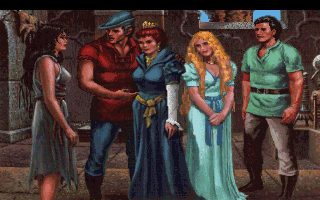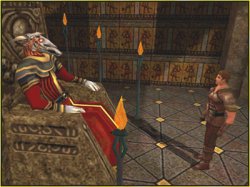The story of the King's Quest series starts off simply, and
gets increasingly complex.
At first, each episode is standalone and self-contained, but
by the fifth game, they make back-references and continue unresolved threads of
previous games.
 |
| Like this tangent. |
King's Quest I is simple: the Kingdom of Daventry
King's Quest II has Sir Graham as the new King, and decides
he needs a wife to bear children. He
looks into the Magic Mirror (one of the three magical treasures), and sees a
woman in a far off land held in a tower.
He decides to rescue her, and upon doing so, she falls in love with him
and marries him.
The third game disappointed many fans because the player did
not control King Graham. In fact,
through 90% of the game, the player had no idea what this game had to do with
the other two.
In King's Quest III, you play a boy named Gwydion, who is a
slave to a wizard named Manannan. The
wizard tends to kill his slaves when they turn eighteen, and you are nearly
that, so you have to escape. To keep the
wizard from capturing you, you turn him into a cat with his spell book.
You then explore the land, eventually find your way back to
Daventry, and rescue Princess Rosella from a dragon. Princess Rosella is Graham's daughter, and as
it turns out, Gwydion is Graham's son, Alexander, who was stolen as a child.
 |
| "Gwydion was a silly name anyway." |
In King's Quest IV, you take control of Rosella, and you are
tasked with finding a magical fruit that can bring her dying father back to
health. Along the way, she meets a man
named Edgar, who asks her to marry him.
She denies him and leaves to save her father. This is a subplot to the now more complex
plot, but it comes back in King's Quest VII.
King's Quest V has you playing King Graham once more, and
his family (and entire castle, for that matter) has been kidnapped by
Manannan's brother Mordack, who wants revenge on Alexander for turning Manannan
into a cat.
During this adventure, Graham meets a girl named Cassima,
who Alexander falls in love with.
In King's Quest VI, Alexander goes off to rescue Cassima,
working as a direct sequel from King's Quest V.
King's Quest VII splits its time between two characters,
Rosella and Queen Valanice. They are
teleported away from each other, and must find their way back home. Rosella runs into Edgar again, and allows him
to court her, giving him a chance.
King's Quest VIII became the death knell for the series,
when the player took control of Connor, a peasant with no relation to the
King's family. Everyone in Daventry has
been turned to stone, and monsters have inhabited the land. You must find pieces of a Mask of Eternity
and put them back together again to save Daventry.
 |
| And it had a different ruler of the underworld for some reason. |
King's Quest VIII was a disappointment to fans, beyond the
gameplay already discussed, but also in terms of story. Since the player does not control anyone
related to King Graham, it felt more like a diversion or side-story. Sierra might have known this would be the
reaction, due to the initial reaction of King's Quest III.
Although this is a brief synopsis of the games and how they
tie together, the games tend to get much more in-depth as they go on, usually
adding a subplot where the player character must save the land they are in,
particularly in King's Quest IV, V, VI, and VII (I and VIII involve this being
the main quest).
Also of note is the increasing complexity and non-linearity
of the games. King's Quest IV and VII
boasted two endings, and VI offered many variations on the ending. King's Quest VI also offered multiple routes
through the game, as well as multiple solutions to some puzzles, and VII
continued the tradition of multiple solutions (although in the case of VII,
this did not change the plot in any considerable way).
The plots of each game will be covered more in-depth as I go
over each game in turn, but it is important to see the co-dependences and
crisscrossing of plot points as the series continued.
No comments:
Post a Comment